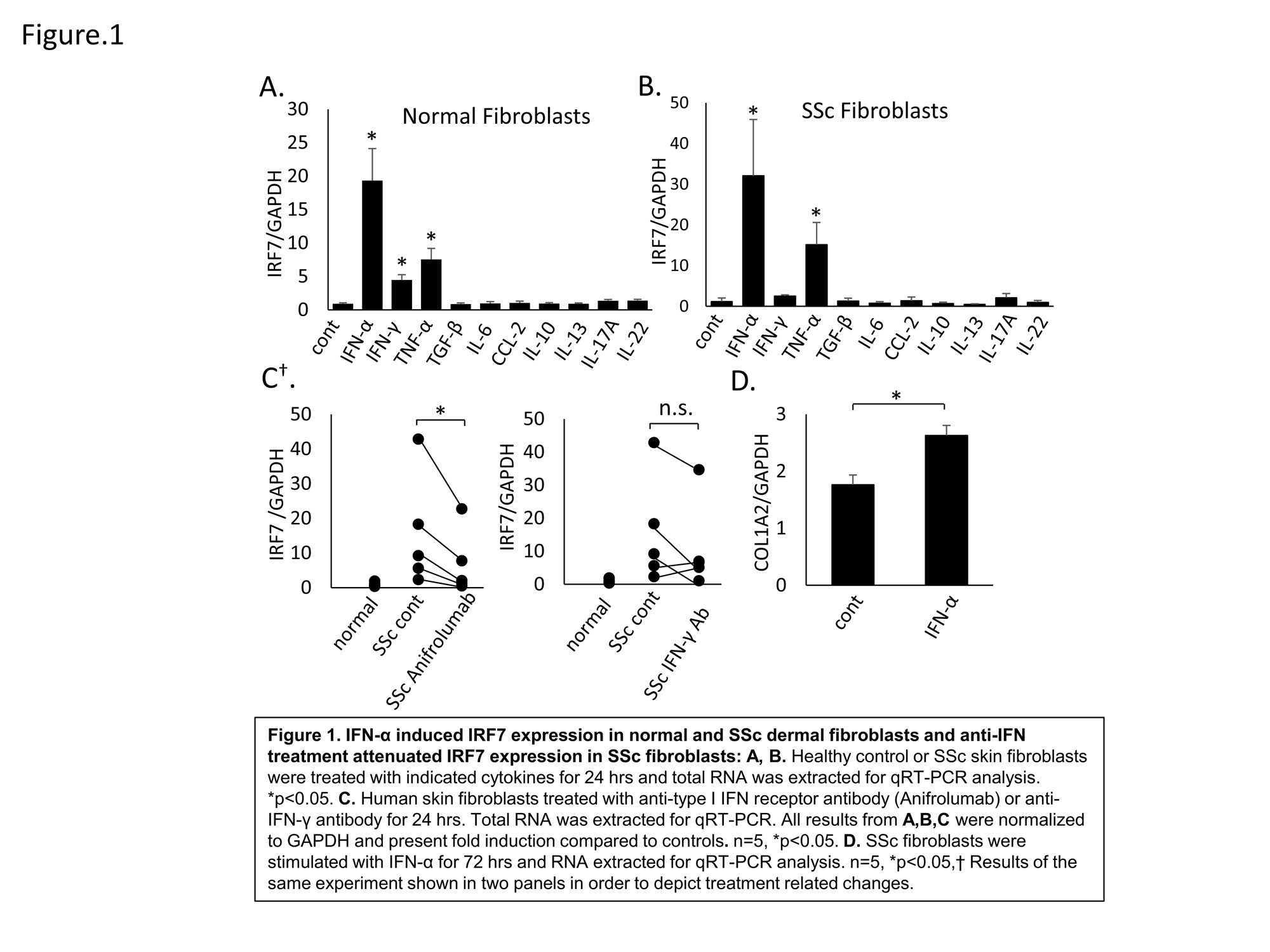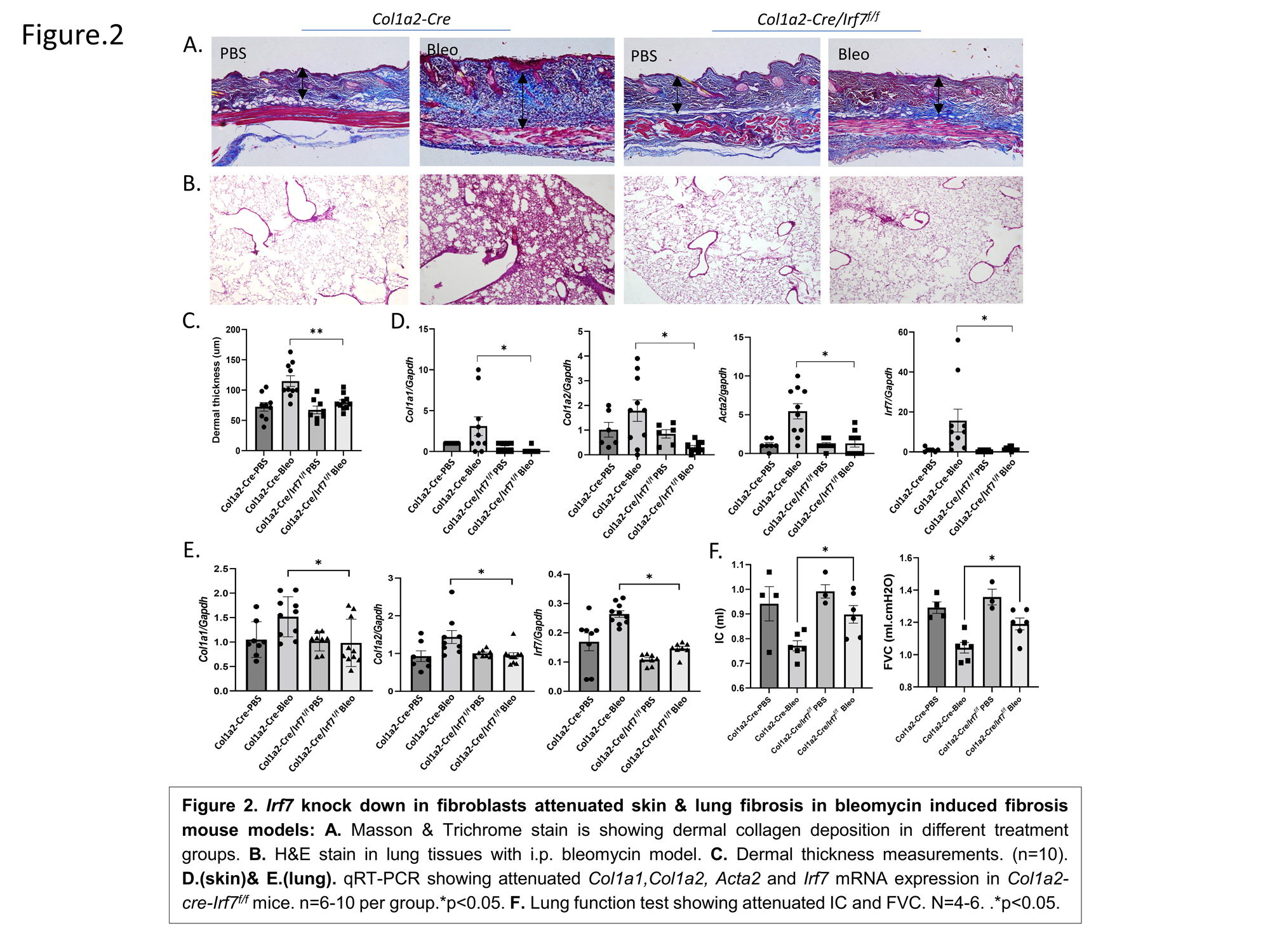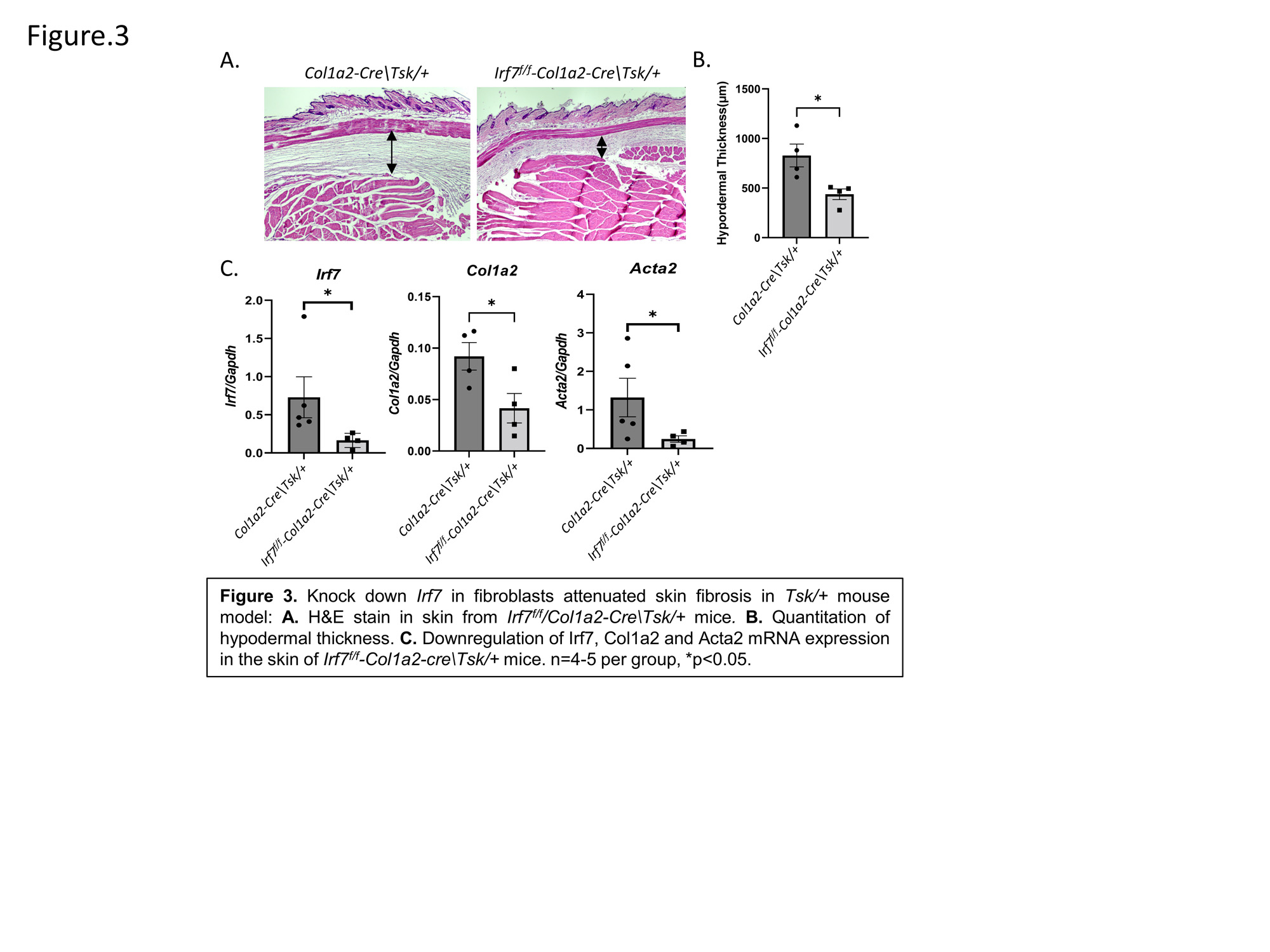Session Information
Date: Monday, November 13, 2023
Title: Abstracts: Systemic Sclerosis & Related Disorders – Basic Science
Session Type: Abstract Session
Session Time: 4:00PM-5:30PM
Background/Purpose: A prominent interferon (IFN) activation signature has been observed at the peripheral blood and end-organ levels in systemic sclerosis (SSc). However, the mechanisms by which the IFN pathway leads to the exaggerated fibrotic response in fibroblasts is not well-understood. Interferon Regulator Factor 7 (IRF7), a key transcription factor in the IFN pathway, has been identified as one of the top predicted upstream regulators of SSc transcript profile in skin bulk sequencing and SSc enriched fibroblast subpopulations in single-RNA sequencing. Herein, we investigated the role of IRF7 in fibroblasts in linking type I IFN activation to fibrosis.
Methods: Skin IRF7 expression and its clinical correlates were examined in 113 SSc patients and 44 matched healthy controls. SSc and healthy control dermal fibroblasts were treated with IFNα and nine prominent Th1, Th2, or Th17 cytokines, as well as with IFN inhibitors. Col1a2-Cre/Irf7f/f fibroblast specific conditional knockout (KO) mice and Col1a2-Cre control mice (n=10 per experimental group) were treated either with daily subcutaneous or intraperitoneal (i.p.) bleomycin injections for 28 days to induce dermal and pulmonary fibrosis, respectively. Furthermore, Col1a2-Cre/irf7f/f\Tsk+ triple congenic mice and Col1a2-Cre/Tsk+ control mice received tamoxifen injections for Cre activation and were examined for hypodermal fibrosis.
Results: Skin IRF7 mRNA levels were higher in SSc patients than in healthy controls (p=0.0009). Moreover, skin IRF7 mRNA levels correlated significantly with modified Rodnan Skin Score (r=0.42, p< 0.0001) and were higher in patients with early diffuse SSc (disease duration < 3 years) than in the remainder of patients(p=0.006). In vitro study (Figure 1), IFNα stimulation resulted in the highest IRF7 expression levels among all examined cytokines in SSc and control fibroblasts. Moreover, treatment with an inhibitory antibody against type I IFN receptor (anifrolumab) consistently led to decreased IRF7 expression in unstimulated cultured SSc fibroblasts while a similar effect was not observed with IFNγ blockade. Linking type I IFN activation to the fibrotic response, IFNα stimulation also led to increased collagen expression in SSc dermal fibroblasts. As shown in Figure 2, in the bleomycin induced dermal fibrosis model, tamoxifen injected Col1a2-Cre/Irf7f/f mice had markedly attenuated dermal fibrosis based on histology and mRNA levels. In i.p. bleomycin lung fibrosis model, tamoxifen injected Col1a2-Cre/irf7f/f mice showed attenuated pulmonary fibrosis based on histology, mRNA, and lung function. In the Col1a2-cre/irf7f/f\Tsk+ triple congenic mice, fibroblast specific Irf7 knock-down led to reduced hypodermal thickness, Col1a2 and Acta2 mRNA levels compared to control Col1a2-Cre/Tsk+ mice after Cre activation (Figure 3).
Conclusion: IRF7 is upregulated in SSc skin and correlates with the severity of skin disease. Its expression in fibroblasts is induced by Type I IFN, and fibroblast-specific deletion of IRF7 abrogated skin and lung fibrosis.IRF7 therefore provides a pathologic bridge between type I IFN signaling and the fibrotic response in fibroblasts.
To cite this abstract in AMA style:
Wu M, Alonso J, charles J, Skaug B, Mills T, Mayes M, Assassi S. Fibroblast Specific Interferon Regulatory Factor 7 (IRF7) Expression Is a Key Link Between Type I Interferon Activation and the Exaggerated Dermal and Pulmonary Fibrosis in Systemic Sclerosis [abstract]. Arthritis Rheumatol. 2023; 75 (suppl 9). https://acrabstracts.org/abstract/fibroblast-specific-interferon-regulatory-factor-7-irf7-expression-is-a-key-link-between-type-i-interferon-activation-and-the-exaggerated-dermal-and-pulmonary-fibrosis-in-systemic-sclerosis/. Accessed .« Back to ACR Convergence 2023
ACR Meeting Abstracts - https://acrabstracts.org/abstract/fibroblast-specific-interferon-regulatory-factor-7-irf7-expression-is-a-key-link-between-type-i-interferon-activation-and-the-exaggerated-dermal-and-pulmonary-fibrosis-in-systemic-sclerosis/



